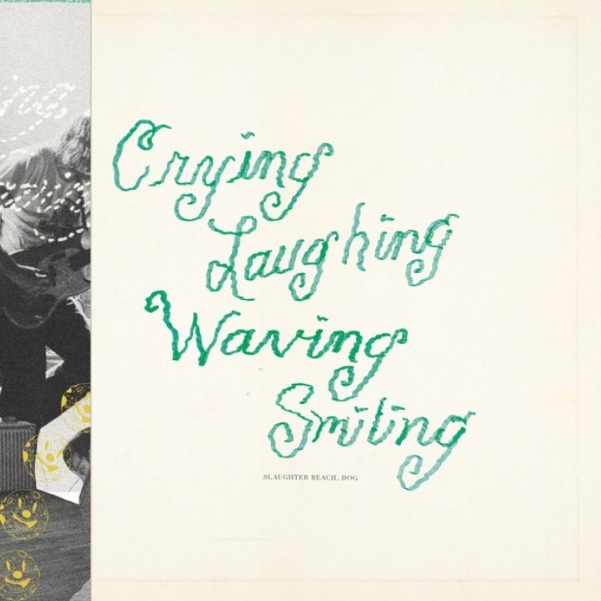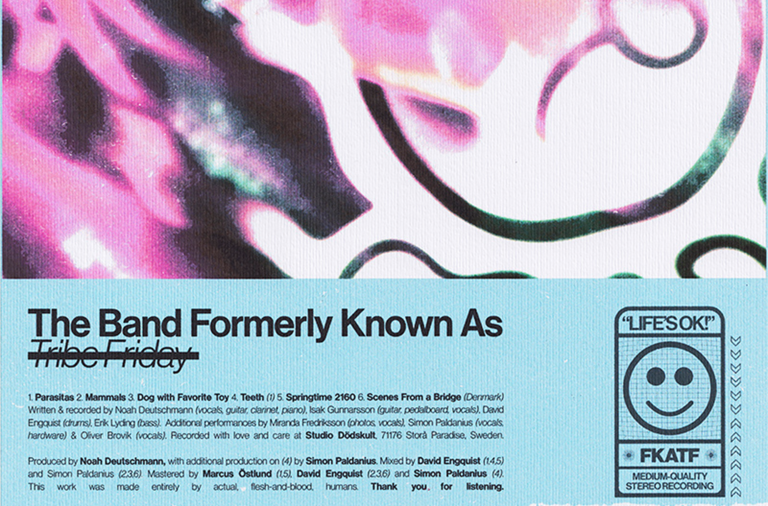Crying, Laughing, Waving, Smiling is the fifth studio album by the American indie folk band Slaughter Beach, Dog. This band started as a solo project by Jake Ewald after a creative block in 2014. Following the breakup of Modern Baseball, a band of which he was co-front man, Ewald continued to make music and expanded the project by adding Ian Farmer (a former member of Modern Baseball) on bass, Adam Meisterhans on guitar, Logan Roth on keyboard, and Zack Robbins on drums.

This new album maintains the indie folk sound that the band has had since its inception. It is a very musically cohesive project with no surprises; you get what you expect. In the lyrics, you can also find classic elements of this style of music, including many references to American landscapes, God, and growing up as a Christian. From an outside perspective, it’s simple to transport yourself to the cinematic content we all have consumed since childhood about the United States and life there. This, along with the universal themes it explores- like love, life and growth- makes it easy to relate to this album.
The first track of the 10 that make up this project is ‘Surfin’ New Jersey’, which eases you into the album. It starts with just the guitar and then the other instruments join in. The vocals are smooth but deep, creating a very relaxed and unhurried atmosphere. As the name suggests, the song is about surfing New Jersey.
Right after, ‘Strange Weather’ begins to play, a song about being so tired of someone that you become sick of yourself. Although it follows the style of the first song, they sound very similar, it seems to be produced from a perspective of having already overcome this situation because it’s very calming. It would be interesting to hear the anger or anxiety of experiencing something like that.
‘Float Away’ is the third track, and it’s the story of falling in love, getting your heart broken, and finding yourself unable to move on. The melody is much more cheerful, and you can easily imagine couples dancing and enjoying this song.
‘My Sister in Jesus Christ’ continues with the upbeat rhythm, talking about growing up in a Christian family with certain ideals and navigating what is right and wrong, but always being able to count on his sister. It has some fun vocals that dance tonally with the guitar, conveying that it wasn’t a traumatic experience, just part of Ewald’s growth and life.
‘Summer Windows’ is in the middle of the album and is about struggling to communicate your feelings, wanting to tell people how you feel but not being able to. It returns to the sound of the beginning of the album, slower and prioritizing the vocals, although the guitar still plays a special role.
‘Bobcat Club’ is a ballad that takes over the entire album. It’s about a bar where there’s a couple who are already there when the singer arrives and are still there when he leaves. This song is a reflection on the passage of time, and this club is a space where nothing ages in his imagination, a place to return to and know that they will be there, as if the years haven’t passed and everything will be the same. The melody accompanies the vocals perfectly, with a lot of distorted guitar sound in the background that doesn’t intrude but helps fill the entire sonic space, ensuring there are no gaps, and you can glide through the melody from start to finish.
Track 7, ‘Tommy’, arises from the question of what is the worst thing God can do, musically moving in the same register as the rest of the album. Half of the song is melody, and Meisterhans’ guitar work is remarkable. The lyrics take us to a personal crisis about his beliefs: “What’s the worst thing God can do to a fool such as me, I can’t believe in any creed,” this is reminiscent of the themes already present on track 4, ‘My Sister in Jesus Christ’, where he talks about his childhood in a Christian family and says, “Mama don’t raise no fools here,” referencing that sinning is for fools.
Right after that comes ‘Engine’, a 9-minute song, with the last 4 minutes being instrumental. There’s a lot of storytelling in the lyrics, ranging from something very real- like a van robbery, to an inner world of how to be an artist and navigate a world where you’ve just started to feel comfortable, even if you’ve been in it for years, and not having a clear direction. The guitar builds up until it takes over the song and carries you through it. The guitar solo is emotionally moving in a subtle way; it’s not loud or surprising, but it cradles you, and the drums provide the perfect support throughout the song. For Ewald, this song raises more questions than answers. At first, he didn’t know what it was about and thought it might be about the van mentioned later in the song, or it could be about Farmer, his bandmate and friend. ‘Engine’ is about navigating life as best as you can.
As a response to ‘Engine’, we have ‘Henry’. This song is the story of a guy who plays bass and dreams of traveling to Europe and playing for cultured people. This song contrasts with ‘Engine’, like a conversation. It maintains the ballad sound of the last songs on the album.
Lastly, the farewell. ‘Easter’ is the final song, a lullaby, and it returns to the theme of God. Ewald talks about his funeral but without worry, as if it’s not the end and brings him peace, longing for that final moment of rest.
Crying, Laughing, Waving, Smiling was released on all platforms on September 22nd, and it’s the perfect soundtrack for a calm and reflective autumn. Slaughter Beach, Dog will be on the American roads during the fall and winter, but they won’t miss out the UK, where they have 5 dates at the end of September and early October. Don’t miss the opportunity to see them live!
Written by: Beatriz Rose
Edited by: Molly Day



